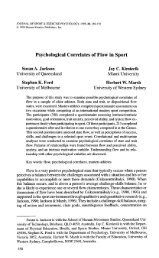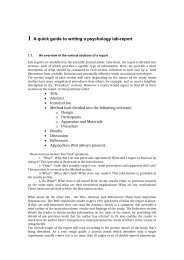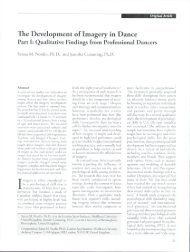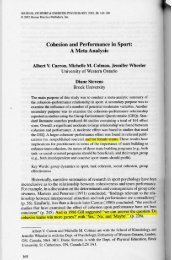Sport and Exercise Psychology Review - Sport Psychology Goes to ...
Sport and Exercise Psychology Review - Sport Psychology Goes to ...
Sport and Exercise Psychology Review - Sport Psychology Goes to ...
You also want an ePaper? Increase the reach of your titles
YUMPU automatically turns print PDFs into web optimized ePapers that Google loves.
Mark B. Andersen<br />
The emphasis is are mine. When is a sport<br />
psychologist’s naming of a famous client in<br />
that client’s best interests? Probably never.<br />
‘Expressed permission’ <strong>to</strong> identify a client<br />
may be clear on the map of ethical conduct,<br />
but the terri<strong>to</strong>ry of ethical practice is<br />
murkier. Asking permission <strong>to</strong> use a client’s<br />
name brings up all sorts of issues. Power differentials<br />
often exist between clients <strong>and</strong><br />
practitioners, <strong>and</strong> such a request for a favour<br />
from the sport psychologist carries with it<br />
seeds of coercion, playing on gratitude <strong>and</strong><br />
subtly implied obligation. If clients in any way<br />
feel obligated <strong>to</strong> let the sport psychologist use<br />
their names, then another ethical problem<br />
arises, <strong>and</strong> that is ‘free <strong>and</strong> informed consent’.<br />
Murkier <strong>and</strong> murkier. The answer <strong>to</strong><br />
the question ‘Who is being served?’ is obviously<br />
the wrong one, <strong>and</strong> it is the sport psychologist<br />
who is possibly exploiting the<br />
athlete for status <strong>and</strong> narcissistic needs. This<br />
name-dropping could also be considered a<br />
form of advertising, implying that a famous<br />
athlete’s performance is due in part <strong>to</strong> the<br />
work of the psychologist. The BPS code states<br />
clearly ‘avoid the use of testimonials in advertisements<br />
for psychological services’, <strong>and</strong><br />
although name-dropping is not a testimonial,<br />
it certainly fits in the terri<strong>to</strong>ry of forbidden<br />
practice implied by this prohibition.<br />
The truly egregious<br />
Heyman <strong>and</strong> Andersen (1998) <strong>to</strong>ld the s<strong>to</strong>ry<br />
of a homophobic sport psychologist whose<br />
client revealed that he was gay. The psychologist<br />
violated confidentiality by informing<br />
the coach. The coach kicked the athlete off<br />
the team. Such abuse of trust is beyond the<br />
pale. In my conversations with athletes <strong>and</strong><br />
sport psychologists, such horror s<strong>to</strong>ries are<br />
all <strong>to</strong>o common. I recall clearly the disastrous<br />
results of a sport psychologist, who was<br />
well-meaning but ignorant, telling an athlete’s<br />
mother that the athlete had an eating<br />
disorder.<br />
The systemic<br />
<strong>Sport</strong> psychology services have widely varied<br />
his<strong>to</strong>ries depending on which country one<br />
observes. Models for service across the globe<br />
have different foci, <strong>and</strong> Stambulova (2004)<br />
has presented a concise description of the<br />
current (<strong>and</strong> past) models in use. Her 2004<br />
book chapter is in Swedish, but is available<br />
from the author in English (see Reference<br />
section). The first genus of models she presents<br />
is labelled ‘performance models’. Confidentiality<br />
becomes problematic in these<br />
models because the focus is primarily on<br />
behaviour (i.e., performance) <strong>and</strong> not necessarily<br />
the happiness <strong>and</strong> well-being of the<br />
athlete. These models have been seen in the<br />
USA during the early days of sport psychology,<br />
<strong>and</strong> still flourish there in some training<br />
institutes. The full flower of these models,<br />
<strong>and</strong> the confidentiality issues surrounding<br />
them, are best seen in the Soviet system of<br />
training athletes. The ultimate client of the<br />
performance model of sport psychology service<br />
delivery in the Soviet system was the<br />
State. Athletes were the means <strong>to</strong> the ends of<br />
showing the superiority of communism <strong>and</strong><br />
the glorification of the Soviet system. After<br />
the State, the next client was the coach. All<br />
information regarding the psychological<br />
strengths <strong>and</strong> weaknesses of athletes was<br />
available <strong>to</strong> the coach in order <strong>to</strong> gain knowledge<br />
useful for enhancing performance.<br />
Thus, there was no confidentiality, <strong>and</strong> anything<br />
said, or any test results stemming from<br />
sport psychologists’ encounters with athletes,<br />
were immediately available <strong>to</strong> the<br />
coach. Arguably, the dominance in the 1960s<br />
<strong>and</strong> 1970s of countries such as the German<br />
Democratic Republic <strong>and</strong> the Soviet Union<br />
was due, in part, <strong>to</strong> this extreme version of<br />
sport psychology service. Today, most sport<br />
psychologists would view this model as<br />
exploitative <strong>and</strong> contrary <strong>to</strong> the humanistic<br />
goals of psychology.<br />
Recently, however, this model has emerged<br />
in a new pseudo-sensitive form in a major<br />
national institute of sport on the world stage.<br />
The former <strong>Sport</strong> <strong>Psychology</strong> Department of<br />
this institute is now called the ‘Performance<br />
<strong>Psychology</strong> Department’. In this new system,<br />
the coach is the client, <strong>and</strong> any information<br />
the athlete reveals in sport psychology ses-<br />
8 <strong>Sport</strong> & <strong>Exercise</strong> <strong>Psychology</strong> <strong>Review</strong> Vol 1 No 2












